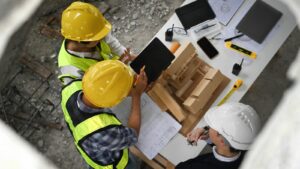In the fast-paced world of construction, the role of a building project manager is pivotal to the success of any project. They juggle multiple responsibilities, from planning and budgeting to coordinating with various stakeholders. This crucial position demands a unique blend of technical knowledge, leadership skills, and problem-solving abilities.
A building project manager ensures that projects are completed on time, within budget, and to the highest quality standards. By efficiently managing resources and navigating potential roadblocks, they play a key role in turning architectural blueprints into reality. Understanding the intricacies of this role can provide valuable insights for anyone looking to succeed in the construction industry.
Building Project Manager
A building project manager oversees all aspects of a construction project. They manage the planning, execution, and closure of construction projects to ensure everything runs smoothly.
- Planning and Scheduling: They create detailed project plans outlining timelines, resources, and key milestones. By managing schedules, they ensure tasks are completed within specified timeframes.
- Budget Management: They prepare budgets, monitor expenditures, and handle financial forecasting. Strict budget controls help avoid cost overruns.
- Team Coordination: They lead multidisciplinary teams, including architects, engineers, and contractors. Effective communication keeps everyone aligned with project goals.
- Quality Control: They enforce quality standards, conduct inspections, and address defects. Ensuring high-quality outcomes is paramount.
- Risk Management: They identify potential risks and devise contingency plans. Proactive risk management mitigates project disruptions.
- Stakeholder Communication: They liaise with stakeholders, providing updates and addressing concerns. Transparent communication fosters trust and cooperation.
Essential Skills
- Technical Knowledge: They possess a thorough understanding of construction methods, materials, and regulations. This technical expertise allows them to make informed decisions.
- Leadership: They motivate and guide teams, resolving conflicts and fostering a collaborative environment. Strong leadership drives project success.
- Problem-Solving: They quickly address issues that arise during construction. Effective problem-solving ensures minimal impact on project timelines.
- Time Management: They prioritize tasks and manage deadlines efficiently. Good time management keeps projects on track.
Importance In Construction
Building project managers ensure projects are delivered on time, within budget, and to the required quality standards. Their leadership and expertise are critical in navigating the complexities of construction, making them indispensable in the industry.
Key Responsibilities
Building project managers play a crucial role in ensuring construction projects run smoothly. They handle numerous responsibilities vital to project success.
Planning and scheduling are fundamental duties. Project managers develop detailed timelines, considering resource availability, project scope, and deadlines. They use tools like Gantt charts and project management software (e.g., MS Project, Primavera). Meticulous planning prevents delays and streamlines the workflow.Effective budget management is essential to avoid cost overruns. Project managers estimate costs, allocate resources, and monitor expenses throughout the project lifecycle. They ensure expenditures align with the budget and adjust financial plans as needed. Accurate budget tracking keeps projects within financial constraints.
Team Coordination
Team coordination requires clear communication and leadership. Project managers assemble and guide diverse teams, including architects, engineers, and contractors. They assign tasks, set expectations, and foster collaboration. Effective team coordination enhances project efficiency and ensures adherence to quality standards.
Essential Skills
Successful building project managers possess a set of essential skills that enable them to manage complex construction projects effectively. These skills are critical in meeting deadlines, budgets, and quality standards.
Effective communication is crucial for building project managers. They must convey project goals, plans, and updates clearly to all stakeholders. For example, they provide progress reports to clients and instructions to team members. Excellent communication minimizes misunderstandings and ensures everyone is aligned.
Leadership And Negotiation
Strong leadership is key in guiding construction teams toward project completion. Building project managers lead by example, inspire their teams, and resolve conflicts. They also possess negotiation skills to handle contracts with vendors and subcontractors, ensuring favorable terms and maintaining project timelines.




